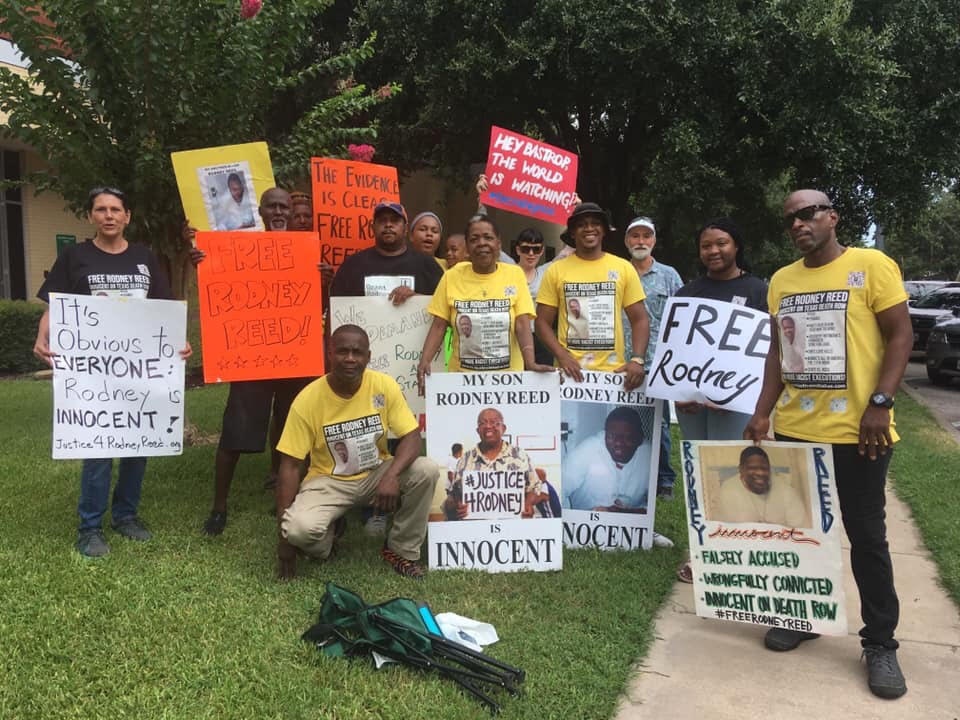The fight to save Rodney Reed from execution in Texas

As his Nov. 20 execution date nears, supporters of Rodney Reed continue to advocate for a man they believe has been wrongfully convicted. (Photo via the Reed Justice Initiative Facebook page.)
In 1998, Rodney Reed, who is African-American, was sentenced to death by an all-white jury in Bastrop, Texas, for the rape and murder of Stacey Stites, a 19-year-old white woman. He's scheduled to be executed on Nov. 20.
Reed, now 53, maintains his innocence. The only evidence used to convict him was DNA that Reed says was present because he and Stites were having a secret affair — a claim Stites's cousin corroborates. Reed's defense attorneys believe that further DNA tests of the crime scene could prove his innocence, but their requests have been denied, leading them to file a lawsuit in federal court. They also recently petitioned the U.S. Supreme Court to halt the execution, citing "new and comprehensive evidence for innocence."
Among the new pieces of evidence Reed's lawyers cite are statements from two witnesses who claim they have information that links Stites's then-fiancé, Jimmy Fennell, to the crime. Fennell, a former police officer in Giddings, Texas, was recently released from prison after serving 10 years for the kidnapping and assault of a woman. There were critical inconsistencies in Fennell's accounts of where he was and what he was doing the night of the murder.
One of the new witnesses who's come forward is a life insurance salesperson who said that while Fennell was applying for a policy he threatened to kill Stites if she ever cheated on him. The other witness, a sheriff's deputy in Texas's Lee County, said he overheard Fennell say to Stites' body at her funeral, "You got what you deserved." In addition, forensic experts who implicated Reed at trial have recanted, while forensic pathologists have said the prosecution's theory of Reed's guilt is medically and scientifically impossible.
That Reed is still on death row despite all the evidence casting doubt on his guilt is indicative of the larger issues around the death penalty — particularly as it pertains to race.
In the U.S., race is the single greatest predictor of who gets the death penalty, not the severity of the crime. Even though whites account for just 55 percent of murder victims nationwide, they account for 80 percent of murder victims in cases resulting in an execution. Those convicted of killing white victims are three times more likely to be sentenced to death than those convicted of killing non-white victims.
The disparities in who is executed are especially stark in Texas, which has the nation's third-largest death row population and accounted for more than half of all the executions in the U.S. last year. Of the states with more than 10 people currently facing execution, Texas has the highest number of minorities on death row. While African Americans make up only 12.6 percent of Texas's population, 43.9 percent of its death row inmates are Black.
These statistics are particularly alarming when one considers that 166 people have been exonerated from death row. Of these, nearly half are Black, and nearly 50 are Black men from the South.
Reed's family has organized a grassroots effort called the Reed Justice Initiative that is working to save Reed's life while also supporting families who are dealing with similar situations. Reed's cause also has help from the nationally recognized anti-death penalty activist Sister Helen Prejean and the Innocence Project, which has launched a petition seeking to halt his execution.
"The evidence supporting Reed's innocence is uncontradicted and undeniable, and without the Supreme Court's intervention, I fear the State of Texas may execute an innocent man," said Bryce Benjet, Reed's lawyer and senior staff attorney at the Innocence Project.
Tags
Rebekah Barber
Rebekah is a research associate at the Institute for Southern Studies and writer for Facing South.
